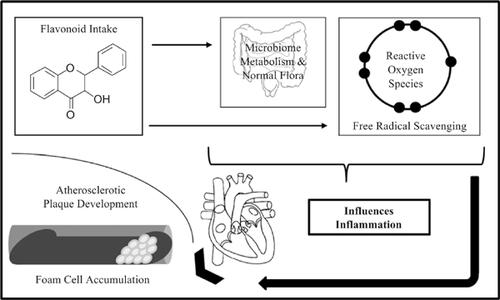Current Pharmaceutical Biotechnology ( IF 2.2 ) Pub Date : 2020-05-31 , DOI: 10.2174/1389201020666191111150239 Lindsay McGrail 1 , Mahdi Garelnabi 1

|
The onset of Cardiovascular Disease (CVD) is known to be associated with multiple risk factors related to exogenous exposures on predisposed genetic makeup. Diet and lifestyle have a cascade effect on microbiota biodiversity, thus impacting inflammation and heart health. Atherosclerosis is a type of CVD where chronic inflammation contributes to plaque buildup in the arteries resulting in narrowed blood vessels, which obstruct blood flow. Polyphenolic compounds, including flavonoids, most commonly consumed in the form of plants, have been identified to have various mechanisms of action to reduce the inflammatory response in the body. Flavonoids provide a variety of nutraceutical functions including antioxidant, antimicrobial, anti-inflammatory, antiangiogenic, antitumor, and improved pharmacokinetic properties. Therefore, the medicinal use of polyphenolic compounds as an intervention for the inflammatory response, especially relating to the gut microbiome, may significantly reduce the risk of atherosclerotic plaque development and disease onset. This review addresses the role of polyphenolic compounds and gut microbiome in cardiovascular disease. Research studies conducted in cells and animals were reviewed. These studies clearly illustrate that dietary polyphenolic compounds influence resident gut microbiota thus they are associated with the prevention of atherosclerosis progression. Further research in this field is warranted to identify potential gut microbiome mediated therapeutic approaches for CVD.
中文翻译:

心血管疾病中的多酚化合物和肠道微生物组。
已知心血管疾病(CVD)的发作与多种遗传因素有关,这些遗传因素与易感基因组成上的外源性暴露有关。饮食和生活方式对微生物群的生物多样性具有级联作用,从而影响炎症和心脏健康。动脉粥样硬化是一种CVD,其中慢性炎症会导致动脉中的斑块积聚,从而导致血管变窄,从而阻碍血液流动。已确定最常见以植物形式消耗的多酚化合物(包括类黄酮)具有多种减少体内炎症反应的作用机制。类黄酮具有多种营养保健功能,包括抗氧化剂,抗菌剂,抗炎剂,抗血管生成剂,抗肿瘤剂和改善的药代动力学特性。因此,多酚化合物作为炎症反应(特别是与肠道微生物组有关)的干预措施的医学应用可以显着降低动脉粥样硬化斑块发展和疾病发作的风险。这篇综述阐述了多酚化合物和肠道微生物组在心血管疾病中的作用。综述了在细胞和动物中进行的研究。这些研究清楚地表明,饮食中的多酚类化合物会影响肠道菌群,因此与预防动脉粥样硬化的进展有关。该领域的进一步研究有必要确定潜在的肠道微生物组介导的CVD治疗方法。可能会大大降低动脉粥样硬化斑块发展和疾病发作的风险。这篇综述阐述了多酚化合物和肠道微生物组在心血管疾病中的作用。综述了在细胞和动物中进行的研究。这些研究清楚地表明,饮食中的多酚类化合物会影响肠道菌群,因此与预防动脉粥样硬化的进展有关。该领域的进一步研究有必要确定潜在的肠道微生物组介导的CVD治疗方法。可能会大大降低动脉粥样硬化斑块发展和疾病发作的风险。这篇综述阐述了多酚化合物和肠道微生物组在心血管疾病中的作用。综述了在细胞和动物中进行的研究。这些研究清楚地表明,饮食中的多酚类化合物会影响常驻肠道菌群,因此与预防动脉粥样硬化的进展有关。该领域的进一步研究有必要确定潜在的肠道微生物组介导的CVD治疗方法。这些研究清楚地表明,饮食中的多酚类化合物会影响肠道菌群,因此与预防动脉粥样硬化的进展有关。该领域的进一步研究有必要确定潜在的肠道微生物组介导的CVD治疗方法。这些研究清楚地表明,饮食中的多酚类化合物会影响肠道菌群,因此与预防动脉粥样硬化的进展有关。该领域的进一步研究有必要确定潜在的肠道微生物组介导的CVD治疗方法。











































 京公网安备 11010802027423号
京公网安备 11010802027423号